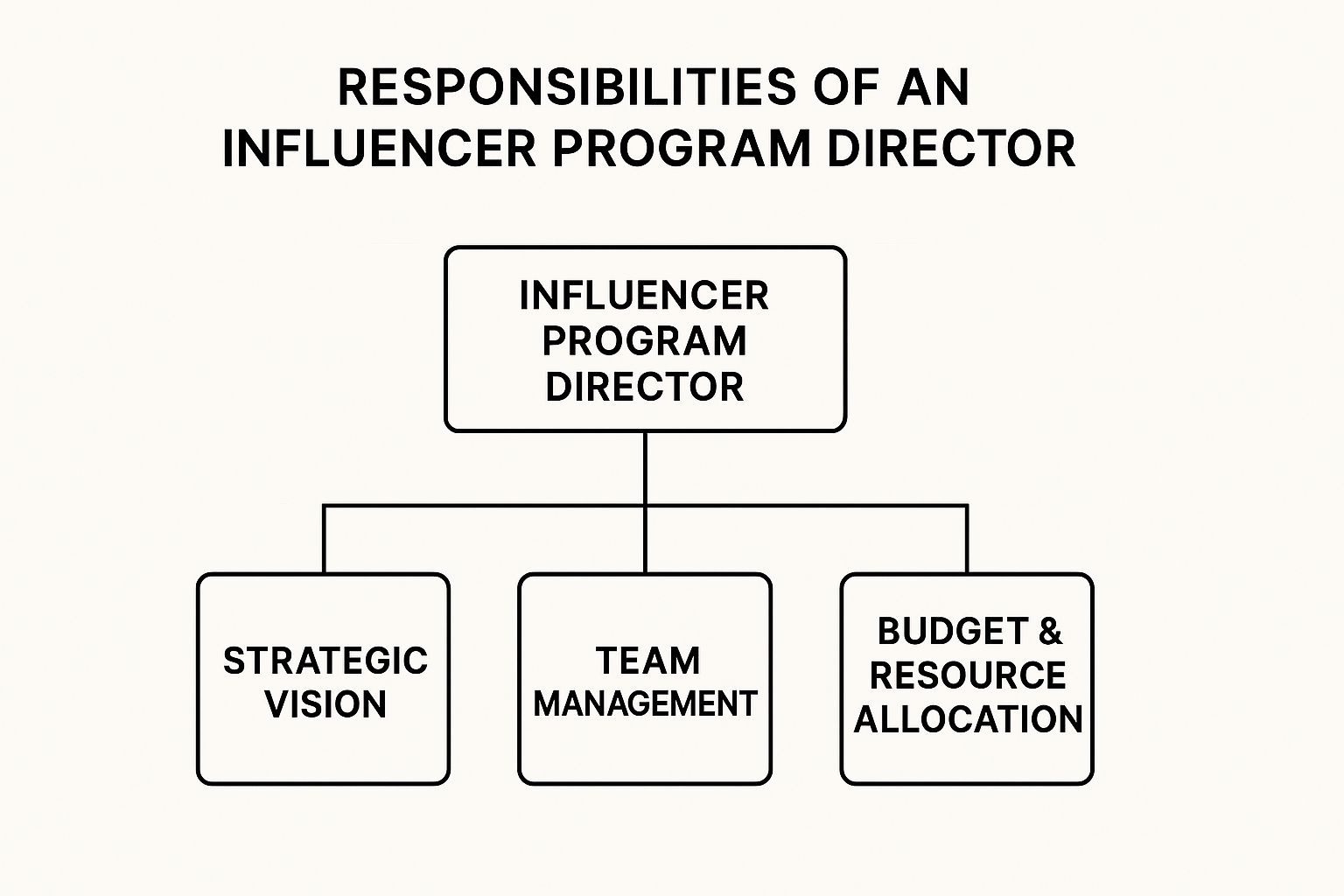
Top Influencer Marketing Roles You Need to Know
Published
Navigating the Influencer Marketing Landscape
This listicle details six key influencer marketing roles, outlining responsibilities, necessary skills, and potential career paths. Understanding these roles is vital for both job seekers and companies building influencer marketing teams. Whether you’re a seasoned professional or just starting out, this guide provides valuable insights into the industry. Learn about the roles of Influencer Marketing Manager, Influencer Talent Agent, Influencer Relationship Specialist, Influencer Content Strategist, Influencer Analytics Specialist, and Influencer Program Director. Finding the right talent is critical for successful influencer marketing campaigns.
1. Influencer Marketing Manager
The Influencer Marketing Manager is the architect and conductor of a brand's influencer marketing orchestra. This pivotal role involves overseeing and executing the entire influencer marketing strategy, from initial concept to final reporting. They are responsible for identifying the right influencers to partner with, developing engaging campaigns, nurturing relationships with these creators, negotiating contracts, meticulously tracking performance metrics, and ensuring a harmonious blend between influencer content and overarching brand objectives. As the central coordinator of all influencer initiatives, the Influencer Marketing Manager acts as the crucial bridge between brands and content creators, striving to maximize ROI from every partnership.

This role deserves a top spot on any list of influencer marketing roles because it represents the core function of the discipline. It's a demanding yet rewarding position requiring a blend of creative vision, analytical prowess, and strong interpersonal skills. The Influencer Marketing Manager is the driving force behind successful influencer campaigns, making them indispensable in today's digital marketing landscape.
Features and Benefits:
- Strategy development and campaign planning: Crafting comprehensive influencer marketing strategies aligned with brand goals.
- Influencer identification and relationship building: Discovering and fostering relationships with relevant influencers across various platforms.
- Budget management and contract negotiation: Managing allocated budgets effectively and securing mutually beneficial contracts with influencers.
- Campaign execution and coordination: Overseeing the seamless execution of campaigns, ensuring all parties are aligned and deliverables are met.
- Performance analysis and reporting: Tracking key metrics, analyzing campaign performance, and generating insightful reports to demonstrate ROI.
Pros:
- Comprehensive oversight of all influencer marketing initiatives.
- Direct impact on marketing ROI and brand awareness.
- Opportunity to work with diverse creative talents.
- Growing career path with increasing demand.
- Exposure to both creative and analytical aspects of marketing.
Cons:
- High pressure to demonstrate ROI from campaigns.
- Managing unpredictable human elements (influencer behavior).
- Constant adaptation to platform algorithm changes.
- Balancing brand control with influencer creative freedom.
- Risk of influencer controversies affecting brand reputation.
Examples of Successful Implementation:
- Dunkin' Donuts' influencer marketing team leveraging TikTok creators to reach younger audiences.
- Fashion Nova's influencer managers coordinating with a vast network of micro-influencers to drive sales.
- HubSpot's influencer marketing team building B2B thought leadership campaigns with industry experts.
Actionable Tips for Influencer Marketing Managers:
- Develop clear and concise campaign briefs that provide direction while allowing for influencer creativity.
- Create standardized processes for influencer vetting, selection, and contracting.
- Implement robust tracking systems using unique codes or links for each influencer to accurately measure campaign performance.
- Prioritize building authentic, long-term relationships with influencers rather than focusing on one-off transactions.
- Stay informed about FTC guidelines and disclosure requirements to ensure ethical and compliant campaigns.
When and Why to Use This Approach:
Employing an Influencer Marketing Manager is crucial when a brand is serious about leveraging the power of influencer marketing. This role is essential for developing and executing a cohesive strategy, managing budgets effectively, and building strong relationships with influencers. It’s particularly relevant for brands targeting specific demographics reachable through influencer channels, aiming to increase brand awareness, or driving conversions and sales.
Influential Figures in Influencer Marketing:
This role has been popularized and shaped by thought leaders such as Mae Karwowski (Founder of Obviously), Neal Schaffer (Author of 'The Age of Influence'), and Brittany Hennessy (Author of 'Influencer: Building Your Personal Brand').
2. Influencer Talent Agent
The Influencer Talent Agent plays a crucial role in the influencer marketing ecosystem, acting as a bridge between content creators and brands. This makes it a vital influencer marketing role for anyone considering a career in the field. Similar to traditional talent agents in the entertainment industry, Influencer Talent Agents represent social media personalities and content creators, helping them navigate the complexities of brand partnerships, negotiate favorable deals, and ultimately grow their careers. They advocate for their clients' interests, ensuring fair compensation and protecting their rights.
How It Works:
An Influencer Talent Agent's primary function is to connect their clients with relevant brand partnerships. They actively source opportunities, negotiate contracts, and manage the relationship between the influencer and the brand. This includes:
- Partnership Sourcing and Deal Negotiation: Agents leverage their network of brand contacts and industry knowledge to find suitable partnerships for their clients. They negotiate contracts, ensuring optimal terms regarding payment, usage rights, and campaign deliverables.
- Contract Review and Rights Protection: Protecting the influencer's intellectual property and ensuring they are fairly compensated is paramount. Agents review contracts meticulously, safeguarding their clients from unfavorable clauses and potential legal issues.
- Rate Setting and Payment Collection: Agents establish appropriate rate cards for their clients based on their audience demographics, engagement rates, and overall influence. They also handle payment collection, ensuring timely and accurate compensation.
- Career Guidance and Growth Planning: Beyond securing deals, agents provide strategic guidance on content creation, audience growth, and long-term career trajectory. They help influencers identify new opportunities and diversify their revenue streams.
- Brand Relationship Management: Agents cultivate and maintain relationships with brands, acting as a liaison between both parties throughout the campaign process. This involves clear communication and efficient project management.
- Crisis Management and Reputation Protection: In the event of a public relations crisis or negative publicity, agents step in to manage the situation, protect their client's reputation, and mitigate potential damage.
Examples of Successful Implementation:
Major talent agencies have recognized the importance of influencer marketing and established dedicated departments to represent digital creators. Some examples include:
- United Talent Agency (UTA) representing TikTok stars like Charli D'Amelio
- WME representing top YouTubers like Lilly Singh
- CAA representing multi-platform creators like MrBeast
These agencies have successfully leveraged their expertise and networks to secure lucrative deals and elevate the careers of their influencer clients.
Pros:
- High earning potential through commission structures
- Building long-term relationships with high-profile talent
- Variety of clients and campaigns
- Inside access to emerging social media trends
- Opportunity to help shape the digital creator economy
Cons:
- Income volatility based on client success
- Managing difficult personalities and expectations
- Constantly accessible to clients (potentially poor work-life balance)
- High-pressure negotiation environments
- Navigating rapidly changing platform policies and algorithms
Tips for Aspiring Influencer Talent Agents:
- Develop niche expertise: Focus on representing creators within a specific industry or content vertical to build a strong reputation and targeted network.
- Standardize processes: Create clear processes for evaluating brand partnership opportunities and managing contracts to ensure efficiency and consistency.
- Transparent communication: Maintain open and honest communication with clients regarding commission structures, payment schedules, and expectations.
- Network extensively: Build strong relationships with brand marketing departments and other industry professionals.
- Stay up-to-date: Keep abreast of FTC guidelines, platform monetization policies, and emerging social media trends.
When and Why to Use This Approach:
Influencer talent agents are essential for creators who want to focus on content creation and leave the business side of influencer marketing to a professional. This approach is particularly beneficial for established influencers with a substantial following and a consistent stream of brand partnership opportunities. It allows them to scale their business and maximize their earning potential while maintaining creative control. This role is crucial for the continued professionalization of the influencer marketing industry and offers a rewarding career path for those with strong negotiation skills, industry knowledge, and a passion for the creator economy.
3. Influencer Relationship Specialist
The Influencer Relationship Specialist is a crucial role within influencer marketing, focusing entirely on cultivating and nurturing the relationships between brands and influencers. Unlike influencer marketing managers who oversee entire campaigns, the Influencer Relationship Specialist concentrates on the human element. They are the bridge between the brand and the influencer, prioritizing building rapport, ensuring seamless communication, resolving any conflicts, and fostering long-term partnerships. They act as the primary point of contact for influencers collaborating with a brand, ensuring these creators feel valued, understood, and aligned with the company's mission. By proactively addressing concerns and maintaining consistent communication, the Influencer Relationship Specialist ensures smooth and productive working relationships.

This role is vital for successful influencer marketing because it recognizes that influencers are not simply media channels, but creative individuals who require personalized attention and genuine connection. This focus on the human element directly translates to more authentic brand advocacy and stronger, more impactful content. The Influencer Relationship Specialist handles various tasks including personalized communication with each influencer, onboarding new influencers to brand programs, scheduling regular check-ins, mediating conflicts, managing expectations, fostering a sense of community among the influencers a brand works with, and coordinating gifts and compensation.
Examples of successful implementation of this role can be seen in brands like Sephora with their Beauty Insider program relationship managers, Revolve's dedicated team managing their extensive influencer network, and GymShark's athlete relations specialists who maintain their robust fitness influencer community. These brands understand the value of dedicated relationship management within their influencer marketing strategies.
Pros of this role include: the opportunity to build deep relationships with creative professionals, a generally lower pressure environment than results-focused roles, the ability to create authentic brand advocacy, the chance to build a valuable network within the creator economy, and seeing the direct impact of strong relationships on content quality.
However, there are also cons to consider: Success metrics can be challenging to quantify, managing expectations between brands and influencers can be tricky, there’s potential for emotional labor and burnout, less direct strategic input into campaign direction, and the occasional sting of rejection when influencers choose competing brands.
Tips for aspiring Influencer Relationship Specialists:
- Personalization is Key: Tailor your communication style to each influencer's preferences.
- Stay Organized: Develop a systematic touchpoint calendar to ensure regular and meaningful engagement.
- Be Proactive: Establish clear escalation pathways for resolving issues quickly and efficiently.
- Seek Feedback: Regularly collect and implement feedback from influencers about their partnership experience.
- Celebrate Successes: Acknowledge and celebrate influencer achievements beyond just campaign metrics.
This role deserves a place on this list of influencer marketing roles because it emphasizes the crucial human element often overlooked in data-driven marketing strategies. By prioritizing genuine connection and fostering long-term relationships, Influencer Relationship Specialists ensure that influencer marketing campaigns are not just transactional but truly collaborative and mutually beneficial. Learn more about Influencer Relationship Specialist. This approach is particularly valuable for brands aiming to build long-term influencer partnerships and foster a strong sense of community among their collaborators. Pioneers in recognizing the importance of this dedicated role include figures like Amber Venz Box (Co-founder of LTK, formerly RewardStyle), James Nord (Founder of Fohr), and Brittany Hennessy (Former Director of Influencer Strategy at Hearst Magazines). They understood early on that nurturing the human connection is paramount for successful influencer marketing.
4. Influencer Content Strategist
The Influencer Content Strategist is a crucial influencer marketing role, responsible for developing the creative concepts and content direction that fuel successful campaigns. This role acts as a bridge, connecting a brand's core messaging with the authentic voice of influencers. By crafting detailed campaign briefs, the Influencer Content Strategist ensures that marketing objectives are met while allowing room for the creator's unique style and platform-specific optimization. They identify the optimal content formats, themes, and messaging that will resonate with target audiences across various platforms, ensuring cohesive campaigns that maintain brand integrity while leveraging each influencer's unique style and audience relationship.

This role deserves its place on this list because it directly impacts the success of influencer marketing campaigns. A skilled strategist can elevate a campaign from a series of sponsored posts to a truly engaging and impactful experience for the target audience. Key features of this role include creative brief development for influencer campaigns, platform-specific content strategy planning, storytelling and narrative development, brand voice alignment across diverse creators, content calendar creation and coordination, and trend analysis and creative opportunity identification.
Benefits of having a dedicated Influencer Content Strategist are numerous:
- Highly creative role with strategic impact: This position allows for a blend of creative thinking and strategic planning, directly influencing the visible outcomes of marketing campaigns.
- Opportunity to work with diverse content formats: From short-form videos on TikTok to in-depth blog posts, the strategist gets to explore and leverage a wide range of content formats.
- Exposure to emerging creative trends: This role requires staying on top of the latest trends, giving the strategist valuable insights into the ever-evolving digital landscape.
- Balance between brand objectives and creator innovation: The strategist acts as a mediator, ensuring that the campaign serves the brand's goals while allowing influencers to express their creativity authentically.
However, the role also presents certain challenges:
- Maintaining brand consistency across creators: Ensuring that diverse influencers stay on-brand can be complex.
- Pressure to produce viral or high-engagement content: While virality is desirable, it's not always predictable or controllable.
- Rapid trend cycles requiring constant adaptation: The digital landscape changes quickly, requiring constant learning and adaptation.
- Navigating creative differences between brands and influencers: Balancing the brand's vision with the influencer's creative input requires strong communication and negotiation skills.
- Difficulty quantifying creative strategy impact: Measuring the direct impact of creative strategy can be challenging.
Examples of successful implementation: Consider Glossier's user-generated content strategies with micro-influencers, Netflix's themed content briefs for show premieres, and Adobe's creative challenges for their Creative Ambassador program. These examples demonstrate how a dedicated content strategy can effectively leverage influencer partnerships.
Actionable tips for aspiring and current Influencer Content Strategists:
- Create flexible briefs that provide direction without stifling creativity.
- Develop platform-specific content strategies rather than one-size-fits-all approaches.
- Build content pillars that align with both brand objectives and influencer strengths.
- Collect and analyze high-performing content examples to inform future strategies.
- Conduct regular trend monitoring sessions across emerging platforms.
Influencer marketing roles like this one have been popularized by industry leaders like Gary Vaynerchuk (Founder of VaynerMedia), Sarah Ware (CEO and Co-founder of Markerly), and Joe Gagliese (Co-founder of Viral Nation). Learn more about Influencer Content Strategist
When and why should you use this approach? When you aim to create impactful and cohesive influencer marketing campaigns that resonate with your target audience while maintaining brand integrity, a dedicated Influencer Content Strategist is essential. This role ensures that your influencer marketing efforts are not just a collection of sponsored posts, but a strategically developed and creatively driven component of your overall marketing strategy.
5. Influencer Analytics Specialist
The Influencer Analytics Specialist plays a crucial role in modern influencer marketing, bringing data-driven decision-making to a field often perceived as subjective. This role is essential for maximizing the impact of influencer marketing campaigns and demonstrating clear value to stakeholders. As brands increasingly invest in influencer collaborations, understanding and measuring the true ROI of these partnerships is paramount, making this one of the key influencer marketing roles in the industry.
This highly analytical role focuses on measuring, analyzing, and reporting data from influencer marketing campaigns. An Influencer Analytics Specialist evaluates everything from campaign performance and influencer selection to audience demographics and engagement metrics. They delve deep into the data, going beyond surface-level engagement numbers like likes and comments, to understand the real impact on brand awareness, conversions, and ultimately, ROI. Learn more about Influencer Analytics Specialist to understand the metrics they prioritize.
How it Works:
The Influencer Analytics Specialist develops tracking methodologies, builds performance dashboards, identifies key performance indicators (KPIs), and recognizes patterns within the data. They then use this information to provide data-driven recommendations for optimizing influencer strategies. This includes identifying the right influencers for specific campaigns, refining campaign messaging, and allocating budget effectively.
Features and Benefits:
- Campaign performance measurement and reporting: Tracking key metrics and generating insightful reports to demonstrate campaign effectiveness.
- Influencer audience analysis and verification: Analyzing audience demographics, interests, and authenticity to ensure alignment with brand objectives.
- ROI and conversion tracking implementation: Measuring the return on investment and tracking conversions generated through influencer activities.
- Competitive analysis and benchmarking: Analyzing competitor strategies and industry benchmarks to identify opportunities and best practices.
- Fraud detection and authenticity verification: Identifying and mitigating fraudulent activities, ensuring authentic influencer partnerships.
- Predictive modeling for influencer selection: Leveraging data to predict the potential success of future influencer collaborations.
Pros:
- Data-driven decision making impact: Provides concrete data to support strategic decisions, minimizing guesswork.
- Rapidly growing field with increasing demand: High demand for skilled analysts in this evolving field presents excellent career opportunities.
- Objective measurement in a subjective industry: Brings much-needed objectivity to influencer marketing, allowing for more accurate performance evaluation.
- Potential to develop proprietary analysis methods: Opportunity to innovate and create unique analytical tools and methodologies.
- Clear demonstration of campaign value to stakeholders: Provides tangible evidence of the impact of influencer marketing investments.
Cons:
- Platform limitations for data collection: Data accessibility and limitations imposed by social media platforms can pose challenges.
- Rapidly changing metrics and algorithms: Constant evolution of social media algorithms requires continuous adaptation and learning.
- Attribution challenges with multi-touch customer journeys: Difficulty in accurately attributing conversions in complex customer journeys involving multiple touchpoints.
- Balancing quantitative and qualitative measures of success: Finding the right balance between data-driven insights and qualitative assessments of content and engagement.
- Communicating complex analysis to non-technical stakeholders: Effectively conveying complex data analysis in a clear and understandable manner to non-technical audiences.
Examples of Successful Implementation:
- Traackr's analytics team developing influence scoring methodologies.
- CreatorIQ's data scientists building audience authenticity algorithms.
- Unilever's influencer analytics team developing their internal measurement framework.
Actionable Tips:
- Develop custom KPIs based on specific campaign objectives beyond engagement.
- Create standardized reporting templates that evolve with platform changes.
- Implement multi-touch attribution models for influencer impact.
- Combine quantitative metrics with qualitative content analysis.
- Build predictive models based on historical performance data.
Influencer Analytics Specialists Popularized by:
Key figures like Pierre-Loïc Assayag (CEO of Traackr), Brendan Gahan (Partner & Chief Social Officer at Mekanism), Julius Dein (CEO of HypeAuditor), and Ted Murphy (Founder of IZEA) have all contributed to the increasing importance of data analysis in influencer marketing. Their work has helped to popularize and legitimize the field, driving demand for skilled Influencer Analytics Specialists.
6. Influencer Program Director
The Influencer Program Director is a critical leadership role within any organization heavily invested in influencer marketing. This executive-level position requires a strategic mind capable of developing and executing comprehensive influencer marketing strategies that align with overall business objectives. They are responsible for building and managing teams, allocating budgets, securing necessary resources, and fostering cross-departmental collaboration. Essentially, the Influencer Program Director acts as the central orchestrator of all influencer-related activities, ensuring maximum impact and return on investment (ROI). This role typically reports to a CMO or VP of Marketing and is responsible for demonstrating the value of influencer marketing to the C-suite while scaling programs effectively. This position is crucial for organizations aiming to leverage the power of influencers to connect with their target audience and achieve significant business growth.

The infographic above visualizes the hierarchical structure of a typical influencer program, highlighting the central role of the Influencer Program Director. It illustrates the director's oversight of various key areas, from strategy and team management to budget allocation and program execution. The director sits at the top, guiding the overall program and its various components.
This role deserves its place in the list of influencer marketing roles due to its significant impact on an organization's overall marketing success. The Influencer Program Director not only shapes the influencer marketing strategy but also ensures its seamless integration with other marketing initiatives.
The key features of this role include strategic leadership and program vision development, team building and talent development, budget allocation and resource management, cross-functional collaboration leadership, policy and guideline development, and executive reporting and stakeholder management. Benefits include having a strategic impact on the overall marketing direction, leadership opportunity with growing importance in organizations, ability to build innovative programs from the ground up, cross-departmental visibility and executive exposure, and the opportunity to shape an emerging marketing channel. Successful examples include Estee Lauder's Global Influencer Marketing Director overseeing programs across multiple brands, Microsoft's Director of Creator Partnerships developing B2B thought leadership, and Adidas' Head of Influencer Marketing managing global athlete and creator relationships.
However, this role also comes with its challenges. The cons include high accountability for program performance and ROI, navigating organizational resistance to influencer marketing, securing adequate budget for an emerging marketing channel, managing risk in a rapidly evolving regulatory environment, and balancing innovative approaches with proven methodologies.
When and why to use this approach: An Influencer Program Director role becomes essential when an organization is ready to scale its influencer marketing efforts beyond ad-hoc campaigns and integrate them into a comprehensive, long-term strategy. This role is crucial for driving strategic growth, maximizing ROI, and ensuring that influencer marketing becomes a core component of the overall marketing mix.
Actionable Tips for Influencer Program Directors:
- Develop comprehensive measurement frameworks that connect to business objectives. Don't just track vanity metrics. Focus on demonstrating how influencer marketing contributes to tangible business outcomes.
- Build scalable programs that can work across product lines and markets. Create a flexible framework that can be adapted to different products, regions, and target audiences.
- Create clear policies for influencer selection, compensation, and crisis management. This ensures consistency and mitigates potential risks.
- Establish cross-functional workflows between PR, social, legal, and product teams. Influencer marketing is most effective when integrated with other marketing functions.
- Benchmark programs against both direct competitors and best-in-class examples. Stay informed about industry best practices and identify areas for improvement.
Individuals who have popularized and shaped this role include Tina Craig (Co-founder of Estate Five and U Beauty), Conor Begley (Co-founder of Tribe Dynamics), Krishna Subramanian (Co-founder of Captiv8), and Virginia Salas Kastilio (Founder of Human Influence). Their work has helped define the importance and scope of influencer program direction. This position presents a challenging yet highly rewarding career path for experienced marketing professionals seeking to make a significant impact in a rapidly growing field.
Influencer Marketing Roles Comparison
| Role | Implementation Complexity 🔄 | Resource Requirements ⚡ | Expected Outcomes 📊 | Ideal Use Cases 💡 | Key Advantages ⭐ |
|---|---|---|---|---|---|
| Influencer Marketing Manager | High – manages campaigns, negotiations, and reporting | Moderate – budget management and tools | Increased brand awareness and marketing ROI | Brands running multi-influencer campaigns requiring oversight | Comprehensive control and ROI focus |
| Influencer Talent Agent | Medium – deal negotiation and client management | Low to Moderate – reliant on networking | Successful brand deals and influencer career growth | Representing and growing influencer careers with brands | High earning potential via commissions |
| Influencer Relationship Specialist | Low to Medium – focused on personal connections | Low – communication and engagement tools | Strong influencer-brand loyalty and smooth collaboration | Brands needing dedicated influencer care and relationship building | Builds authentic, long-term partnerships |
| Influencer Content Strategist | Medium – creative planning and content alignment | Moderate – creative resources and platform knowledge | Engaging, cohesive content that resonates with audiences | Campaigns emphasizing brand-consistent creative content | Balances brand goals with creator innovation |
| Influencer Analytics Specialist | Medium to High – data analysis, reporting, predictive modeling | Moderate to High – analytics platforms and expertise | Data-driven optimization and validated campaign impact | Brands prioritizing measurable influencer marketing ROI | Objective insights and performance tracking |
| Influencer Program Director | High – strategic leadership, team and budget management | High – organizational resources and cross-team coordination | Scaled influencer programs aligning with business goals | Large organizations integrating influencer marketing at scale | Executive visibility and strategic influence |
Ready to Launch Your Influencer Marketing Career?
This listicle has explored six key influencer marketing roles, ranging from Influencer Marketing Manager to Influencer Program Director, each offering unique opportunities within this dynamic field. We’ve highlighted the core responsibilities, necessary skills, and potential career paths for each, providing a comprehensive overview of the influencer marketing landscape. Understanding these diverse influencer marketing roles is crucial for anyone looking to break into or advance within this exciting industry. Mastering the specific skills and knowledge associated with each role allows you to target your job search effectively and position yourself for success. Want to dive deeper into the world of influencer marketing? Check out this comprehensive influencer marketing guide from Influencer Marketing Guide 2024 from ECORN. This knowledge not only benefits individual career growth but also contributes to the overall effectiveness and sophistication of influencer marketing campaigns, ultimately driving better results for brands and influencers alike.
The world of influencer marketing is constantly evolving, presenting new challenges and exciting prospects. Whether you're a seasoned marketer or just starting out, embracing these opportunities can lead to a fulfilling and impactful career. Ready to take the next step? Explore the latest influencer marketing roles and find your perfect fit at Influencer Marketing Jobs. This dedicated platform connects talented professionals with top companies seeking expertise in this rapidly growing field.